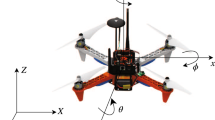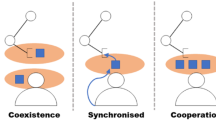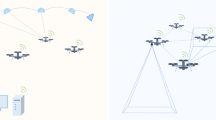Abstract
Although explicit coordination of team search may provide solid performance for small team sizes, it has been shown that such methods do not scale to larger teams due to limited communications bandwidth and computational requirements. In addition, methods that rely upon persistent, reliable network connections may have limited applicability to real-world search problems. In this work, we explore implicit cooperation enabled through sharing of search progress information. Prior research shows cooperation paradigms in which team members share a global task list result in interference and duplication of search when members choose the same search areas. Methods that only use local sensor information to identify search targets require fewer message exchanges and create less interference between robots than existing shared approaches. In addition, search progress and completion are more consistent due to the reduction in interference. Results based on simulations and physical experiments are presented that compare performance in terms of time-to-cover, consistency, and interference.
Similar content being viewed by others
References
Anderson, M., Papanikolopoulos, N.: Reducing sensitivity to dead-reckoning error through local search. In: Proc. of the IEEE/RSJ International Conference on Intelligent Robots and Systems (IROS), San Diego, CA, 29 October–2 November 2007
Balch, T., Arkin, R.C.: Communication in reactive multiagent robotic systems. Auton. Robots 1(1), 27–52 (1994)
Brooks, R.: Intelligence without reason. Artif. Intell. 47(1–3), 139–159 (1991)
Burgard, W., Moors, M., Stachniss, C., Schneider, F.E.: Coordinated multi-robot exploration. IEEE Trans. Robot. Autom. 21(3), 376–386 (2005)
Elfes, A.: Using occupancy grids for mobile robot perception and navigation. Computer 22(6), 46–57 (1989)
Fang, G., Dissanayake, G., Lau, H.: A behaviour-based optimisation strategy for multi-robot exploration. IEEE Conference on Robotics, Automation and Mechatronics, Singapore, 1–3 December 2004
Freda, L., Oriolo, G.: Frontier-based probabilistic strategies for sensor-based exploration. In: Proc. of the IEEE Intl. Conf. on Robotics and Automation (ICRA), Barcelona, 18–22 April 2005
Gerkey, B., Vaughan, R., Stoy, K., Howard, A., Sukhatme, G., Mataric, M.: Most valuable player: a robot device server for distributed control. In: Proc. of the IEEE/RSJ Intl. Conf. on Intelligent Robots and Systems (IROS), Maui, HI, 29 October–3 November 2001
Gordon, G.J.: Path planning for Java and Matlab. http://www.cs.cmu.edu/~ggordon/PathPlan/ (2007)
Howard, A., Mataric, M.J., Sukhatme, G.S.: An incremental deployment algorithm for mobile robot teams. In: Proc. of the IEEE/RSJ International Conference on Intelligent Robots and Systems (IROS), vol. 3. IEEE, Piscataway (2002)
Howard, A., Mataric, M.J., Sukhatme, G.S.: Mobile sensor network deployment using potential fields: A distributed, scalable solution to the area coverage problem. Distrib. Auton. Robot. Syst. 5, 299–308 (2002)
Isaacs, M., Anderson, M., Ashworth, S., Blackburn-Lynch, J., Bynum, B., Pearce, J., Pemberton, C.: Breaking up is hard to do—dispersion: from design to implementation. In: Proc. of the IEEE Intl. Conf. on Robotics and Automation (ICRA), Orlando, FL, 15–19 May 2006
Makarenko, A., Williams, S., Bourgault, F., Durrant-Whyte, H.: An experiment in integrated exploration. In: Proc. of the IEEE/RSJ Intl. Conf. on Intelligent Robots and Systems (IROS), Lausanne, 30 Sepember–4 October 2002
Parker, L.: The effect of action recognition and robot awareness in cooperative robotic teams. In: Proc. of the IEEE/RSJ International Conference on Intelligent Robots and Systems (IROS), Los Alamitos, CA, 5–9 August 1995
Pearce, J.L., Rybski, P.E., Stoeter, S.A., Papanikolopoulos, N.: Dispersion behaviors for a team of multiple miniature robots. In: Proc. of the IEEE Intl. Conf. on Robotics and Automation (ICRA), Taipei, 14–19 September 2003
Rosenfeld, A., Kaminka, G.A., Kraus, S.: A Study of Scalability Properties in Robotic Teams. Springer, Heidelberg (2005)
Simmons, R., Apfelbaum, D., Burgard, W., Fox, D., Moors, M., Thrun, S., Younes, H.: Coordination for multi-robot exploration and mapping. In: Proceedings of the AAAI National Conference on Artificial Intelligence, Austin, TX, 30 July–3 August 2000
Tovar, B., Lavelle, S., Murrieta, R.: Optimal navigation and object finding without geometric maps or localization. In: Proc. of the IEEE/RSJ Intl. Conf. on Robotic Automation (ICRA), Taipei, 12–17 May 2003
Ulrich, I., Borenstein, J.: VFH+: reliable obstacle avoidance for fast mobile robots. In: Proc. of the IEEE Intl. Conf. on Robotics and Automation (ICRA), Leuven, 16–20 May 1998
Wagner, I.A., Lindenbaum, M., Bruckstein, A.M.: MAC versus PC: determinism and randomness as complementary approaches to robotic exploration of continuous unknown domains. Int. J. Robot. Res. 19(1), 12 (2000)
Yamauchi, B.: A frontier-based approach for autonomous exploration. In: IEEE International Symposium on Computational Intelligence in Robotics and Automation, Monterey, CA, 10–11 July 1997
Yamauchi, B.: Frontier-based exploration using multiple robots. In: International Conference on Autonomous Agents, Minneapolis, MN, 9–13 May 1998
Author information
Authors and Affiliations
Corresponding author
Additional information
This work has been supported in part by NSF through grants #IIS-0219863, #CNS-0224363, #CNS-0324864, #CNS-0420836, #IIP-0443945, #IIP-0726109, and #CNS-0708344.
Rights and permissions
About this article
Cite this article
Anderson, M., Papanikolopoulos, N. Implicit Cooperation Strategies for Multi-robot Search of Unknown Areas. J Intell Robot Syst 53, 381–397 (2008). https://doi.org/10.1007/s10846-008-9242-5
Received:
Accepted:
Published:
Issue Date:
DOI: https://doi.org/10.1007/s10846-008-9242-5




